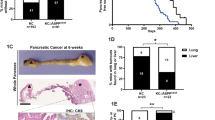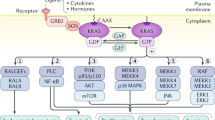Abstract
Overexpression of p53 correlates with neoplasia in many cytological specimens. To test the specificity of overexpressed p53 as a tumour marker for the detection of pancreatic cancer, we analysed cytological specimens of pancreatic juice samples from patients with pancreatitis or pancreatic carcinoma (n = 42) for p53 protein overexpression. p53 protein overexpression was found in 59% of patients with pancreatitis and 67% of patients with pancreatic carcinoma. Thus, the assessment of p53 protein overexpression is not useful in the diagnosis of pancreatic cancer. Overexpressed p53 during pancreatitis appears to be wild-type p53. Overexpression of p53 may result from DNA damage occurring during chronic inflammation. It is well established that p53 can induce apoptosis upon DNA damage. Consequently, we found apoptotic cell death in five out of five tested cytological preparations from patients with pancreatitis as well as in one out of one pancreatic carcinoma specimen.
This is a preview of subscription content, access via your institution
Access options
Subscribe to this journal
Receive 24 print issues and online access
$259.00 per year
only $10.79 per issue
Buy this article
- Purchase on Springer Link
- Instant access to full article PDF
Prices may be subject to local taxes which are calculated during checkout
Similar content being viewed by others
Author information
Authors and Affiliations
Rights and permissions
About this article
Cite this article
Maacke, H., Kessler, A., Schmiegel, W. et al. Overexpression of p53 protein during pancreatitis. Br J Cancer 75, 1501–1504 (1997). https://doi.org/10.1038/bjc.1997.256
Issue Date:
DOI: https://doi.org/10.1038/bjc.1997.256
This article is cited by
-
p53 inhibitor iASPP is an unexpected suppressor of KRAS and inflammation-driven pancreatic cancer
Cell Death & Differentiation (2023)
-
Mitochondrial dysfunction and apoptosis of acinar cells in chronic pancreatitis
Journal of Gastroenterology (2008)
-
Morphological and immunohistochemical characterization of isolated tumor cells by p53 status in gastrointestinal tumors
Langenbeck's Archives of Surgery (2007)
-
Histological evaluation of preoperative biopsies from ampulla Vateri
Pathology & Oncology Research (2003)
-
Apoptosis and p53 expression in rat adjuvant arthritis
Arthritis Research & Therapy (2000)



